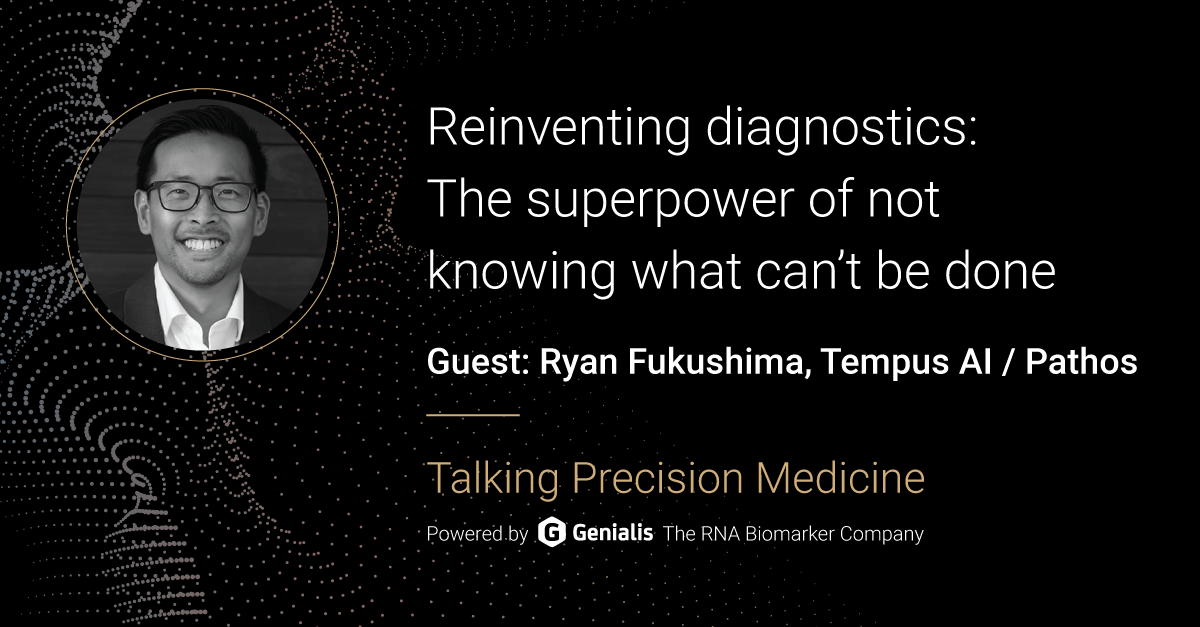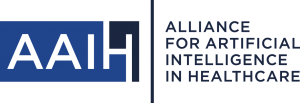Welcome to Talking Precision Medicine (TPM podcast) — the podcast in which we discuss the future of healthcare and health technology, and how advances in data and data science are fueling the next industrial revolution.
What a pleasure to welcome today’s guest, Ryan Fukushima, chief operating officer of TempusAI. Not only has Ryan helped build Tempus brick by brick from the earliest days, he is also CEO of Pathos AI, a biotech company using real world data and AI to develop true precision medicines. I don’t know how he juggles it all, but unless you’ve been hiding out these last few years, Tempus has become a household name in our industry, completing a highly successful IPO last year.
Come on in and have a listen.
Episode highlights:
The mission of Tempus AI
“We’ve been focused on solving this fundamental data problem that exists in precision medicine, largely connecting molecular data at scale, connected with longitudinal outcomes and things like imaging, so that you can usher in this new future of AI-enabled diagnostics.”
- Tempus AI was founded 10 years ago to help make sure patients are on the right drug at the right time, so they can live longer and healthier lives.
- The company has built one of the largest sequencing labs in the U.S. and has integrations with over 2,000 health systems to create a multimodal dataset.
The company’s origins
“It started with Eric Lefkofsky’s personal experiences with cancer care with his wife’s case, which he talks publicly about. And so, as he was going through it with his wife’s case, what’s ironic is I was going through it with my mother’s case with stage four non-small cell lung cancer.”
- Ryan Fukushima and Eric Lefkofsky saw that data was not connected, preventing doctors from learning how similar patients had responded to treatment.
- The business model of diagnostics was flawed, often prioritizing smaller, cheaper tests rather than broader, more comprehensive ones.
Scaling AI and real-world data
“What was funny about when we got started is that to many, we appeared out of nowhere. We came out of nowhere. People didn’t really hear about us, but in the first two or three years we were talking to probably 50 to 70 different health systems about this concept of the technology that we’re building to bring not just comprehensive diagnostics to your cancer patient populations, but organizing this data so that those diagnoses are even better over time.”
- Tempus built a learning health system that improves diagnostics and patient care over time.
- The biggest challenge was convincing health systems to integrate their data, which sometimes required major IT shifts.
The role of RNA
“When we first got started, many existing customers told us, ‘We have no interest in transcriptomic data. I wouldn’t even know what to do with that data.’ And now they do.”
- Tempus pioneered the use of large-scale RNA data, demonstrating its value in clinical and research settings.
- The initial market for transcriptomic data did not exist, requiring Tempus to create demand for RNA-based insights.
Algorithms as the future of diagnostics
“So much of the tailored decision-making for a patient case or a cancer subtype is going to depend upon more specialized models or algorithms that can be applied to really help make the best decision possible.”
- AI is transforming diagnostics, shifting from static tests to algorithm-driven decision-making.
- Tempus envisions a future with thousands of specialized AI models, helping doctors make better, data-driven decisions.
Pathos and solving drug development challenges
“Too often, phase one trials don’t provide a clear enough signal on how to design patient selection for phase two. As a result, programs get shelved—not because the drug is bad, but because it’s unclear how to optimize the next trial.”
- Pathos, a Tempus spinout, focuses on fixing phase two of drug development.
- Many promising drugs fail not because they don’t work, but because trials are not designed to optimize patient selection.
- By leveraging multimodal data, Pathos aims to double clinical trial success rates.
A look into the future
“If we do our job right, we believe those types of algorithms and those types of approaches will exist for many diseases—not just in oncology, but also in cardiology and beyond.”
- AI-powered diagnostics will expand beyond oncology, with applications in cardiology, neurology, and other diseases.
- The future of medicine will be less about ordering individual tests and more about integrating AI-driven insights into clinical workflows.
This has been Talking Precision Medicine. Please subscribe and share our podcast with your colleagues, leave a comment or review, and stay tuned for the next episode. Until then you can explore our TPM podcast archive and listen to interesting guests from our past conversations.




